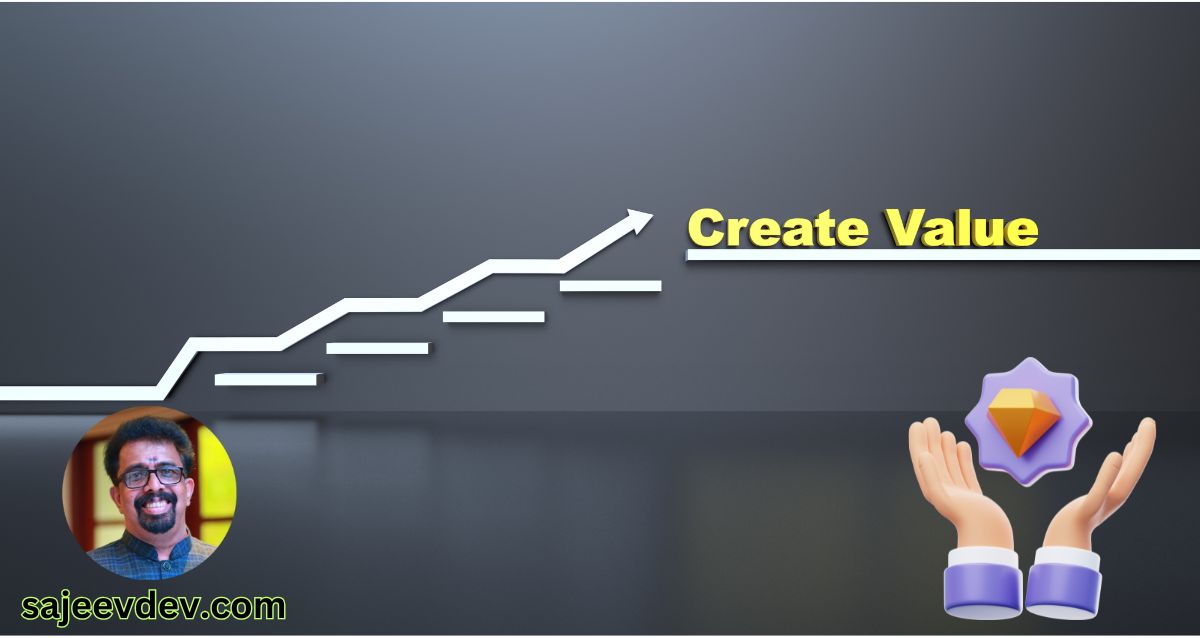Value vs. Wealth
In today’s society, the terms “value” and “wealth” are often used interchangeably; however, they represent fundamentally different concepts. Wealth typically refers to the accumulation of financial resources and material possessions. It is a quantifiable measure, often highlighted by factors such as net worth, assets, and income levels. Conversely, value encompasses the broader implications of one’s actions and contributions, emphasizing the qualitative aspects of success that extend beyond monetary gains. This distinction is critical for anyone aspiring to achieve meaningful success.
Wealth can be viewed as a byproduct of value creation. When individuals or organizations focus on providing genuine value—whether through innovative products, impactful services, or enriching experiences—they naturally attract financial rewards. Therefore, the pursuit of wealth, when divorced from a commitment to creating value, may lead to fleeting satisfaction or superficial achievements. Instead, it is the alignment of one’s efforts with a purpose that fosters sustainable growth and a deeper sense of fulfillment.
Moreover, the journey of creating value often results in significant societal impact, positively influencing communities and environments. This impact can be measured not only in economic terms but also through advancements in quality of life, education, and wellbeing. In this regard, value transcends traditional metrics of success, engaging with a multidimensional framework that encompasses personal growth, interpersonal relationships, and contributions to society.
In understanding the distinction between value and wealth, one can begin to redefine what success truly means. By prioritizing meaningful contributions over financial accumulation, individuals and organizations can cultivate a legacy that resonates well beyond their immediate existence. As we delve deeper into this topic, we will explore how adopting a value-oriented mindset can lead to a more fulfilling and impactful life.
The Importance of Creating Genuine Value
In today’s fast-paced world, the significance of creating genuine value cannot be overstated. While traditional measures of success often focus on the accumulation of wealth, true fulfillment and societal advancement emerge from delivering value in meaningful ways. Genuine value consists not only of material benefits but also of emotional, intellectual, and social contributions that enrich individual lives and communities alike.
When individuals and organizations prioritize value creation, they naturally foster a sense of community and collaboration. This collaborative environment strengthens relationships and promotes trust, allowing people to work together toward shared goals. By focusing on meaningful contributions, we encourage diverse perspectives and innovative thinking, which can lead to improved solutions for societal challenges. This engagement helps build a resilient community where members support one another and share resources, creating a robust network that thrives on mutual success.
Moreover, creating genuine value goes hand-in-hand with economic growth. Businesses that focus on providing value to their customers often experience increased customer loyalty and satisfaction, leading to sustainable success. A value-driven approach can stimulate local economies by supporting ethical practices, fair employment, and high-quality services or products. When businesses engage in value creation, they not only serve their bottom line but also enhance their reputation and brand, ultimately reaping rewards in the long term.
Value creation represents a shift in paradigm from merely seeking wealth to pursuing deeper impact. By investing in relationships, community well-being, and economic health, individuals and organizations position themselves to gain not only financial success but also personal satisfaction and a sense of purpose. Recognizing and prioritizing the importance of creating genuine value paves the way for lasting achievements that resonate beyond numbers and profit margins.
Case Studies: Successful Value Creators
In modern business landscapes, several exemplary individuals and companies have taken the initiative to prioritize value creation over mere wealth accumulation. One such case is that of Patagonia, an outdoor apparel brand committed to environmental sustainability. Since its inception, Patagonia has adopted the ethos of “buy less, demand more.” Rather than striving for the highest profits, the company focuses on producing high-quality, sustainable products that minimize environmental impact. Their transparent approach to business and commitment to eco-friendly practices have cultivated a loyal customer base, enhanced brand reputation, and established a model for responsible corporate behavior.
Another notable example is the tech giant, Microsoft. Under the leadership of Satya Nadella, the company has shifted its focus from competition-towards collaboration, emphasizing innovation and inclusivity. Microsoft’s transformation involved investing in cloud computing and artificial intelligence to help various sectors thrive. By creating value through technology that enables productivity and connection, Microsoft not only enriched its offerings but also positively impacted individuals and businesses worldwide. This pivot towards meaningful success has reinvigorated the organization, proving that sustainable growth can be achieved through a commitment to value creation.
Similarly, Apple Inc. exemplifies a harmonious blend of innovation and human-centric design. The company prioritizes user experience and social responsibility in product development, going beyond profit-driven motives. Their emphasis on privacy, accessibility, and environmental stewardship has transformed customer loyalty into a powerful competitive advantage. As such, Apple has solidified its position as not just a technology leader, but also a value creator in the marketplace, illustrating the profound impact of prioritizing value over wealth.
These case studies illustrate that focusing on value creation can lead to sustainable success and widespread positive impacts. By prioritizing meaningful contributions to society, these organizations have redefined success, establishing themselves not only as leaders in their respective industries but also as champions of a more sustainable future.
The Mindset Shift: From Profit-Driven to Value-Driven
In today’s rapidly evolving economic landscape, a significant transformation in mindset is essential for achieving not just financial success but meaningful success. The shift from a profit-driven mentality to a value-driven approach can profoundly alter the trajectory of personal growth and business advancement. Embracing this mindset necessitates a foundational change in how individuals and organizations perceive success. Rather than merely focusing on short-term gains, it becomes imperative to prioritize the creation of value for all stakeholders.
To cultivate a value-driven mindset, one effective technique is to embrace purpose. This involves identifying and understanding the core mission behind any endeavor, whether it be a personal goal or a business strategy. Establishing a clear purpose can guide decision-making processes and inspire actions that align more closely with long-term value creation. Furthermore, recognizing that customers and clients are more likely to support a brand that demonstrates a commitment to societal value can lead to a more loyal customer base and enhance overall business sustainability.
Another essential aspect of this mindset shift is the development of empathy. By fostering a deeper understanding of customers’ needs, preferences, and experiences, individuals and organizations can tailor offerings that resonate well beyond the superficial exchange of goods or services. This empathetic approach can also inspire innovation, as it encourages the exploration of solutions that address real-world challenges faced by individuals and communities.
Lastly, adopting long-term thinking is crucial for lasting success. This requires a willingness to forego immediate profits for the sake of building robust relationships, investing in community initiatives, and enhancing brand reputation. A focus on value encourages businesses and individuals to think critically about their impact and legacy, ultimately contributing to a more equitable and sustainable future.
Strategies for Creating Lasting Value
Creating lasting value encompasses approaches that span across various contexts, including business, personal life, and community service. The foundation of these strategies lies in the identification and leverage of individual strengths, enabling meaningful contributions to society and oneself. This section outlines practical methodologies that facilitate the generation of value across diverse arenas.
In a business environment, one effective strategy involves adopting a purpose-driven approach. Companies should clearly define their mission and values, centering operations around these core principles. This not only enhances employee engagement but also fosters a connection with customers who resonate with the brand’s vision. Incorporating practices such as corporate social responsibility (CSR) can significantly bolster a company’s reputation while providing considerable community benefits.
On a personal level, individuals can create lasting value by setting long-term goals aligned with their passions and skills. By engaging in self-reflection, one can identify unique strengths and determine how these can be utilized to contribute positively to others. Building networks based on shared interests can amplify this effort, facilitating collaborative projects that ultimately drive mutual value.
In the realm of community service, volunteering aligned with one’s skills can lead to substantial impact without the need for vast resources. Individuals should consider local organizations that could benefit from their expertise, whether through mentorship, teaching, or hands-on service. Such creation of value not only benefits the community but also enriches the volunteer’s experience, fostering personal growth and connection.
Lastly, continuous learning is crucial for sustaining and enhancing value creation efforts. Engaging in workshops, online courses, and networking events can improve skills, expand knowledge, and enable individuals to remain adaptable in a changing world. By incorporating these strategies into everyday practices, it is possible to contribute meaningfully across all areas of life. These efforts ultimately lead to the creation of lasting value over mere monetary wealth.
Measuring Value: Metrics Beyond Money
In an era where financial success often overshadows other forms of achievement, it is crucial to recognize that value can manifest in numerous ways that extend beyond monetary gain. Measuring value involves identifying metrics that capture the broader impacts of an enterprise, including customer satisfaction, community engagement, environmental sustainability, and overall social contribution. These indicators provide a fuller picture of what successful value creation entails.
Customer satisfaction is one of the most significant metrics when measuring value. It reflects not only the quality of a product or service but also the emotional connection a business establishes with its clients. High levels of customer satisfaction often lead to increased loyalty and referrals, reinforcing a positive feedback loop that benefits both customers and businesses alike. Surveys, Net Promoter Scores (NPS), and customer reviews serve as reliable tools to assess and quantify this vital component.
Community engagement is another essential metric of value. Businesses that actively contribute to their local communities often enjoy enhanced reputations and consumer trust. These contributions can include sponsoring local events, supporting charitable causes, or engaging in partnerships that foster community development. The measurement of community impact can be quantified through metrics such as volunteer hours, monetary donations, and community feedback highlighting the business’s role in enhancing local quality of life.
Environmental sustainability further illustrates the multifaceted nature of value creation. Companies that prioritize eco-friendly practices not only contribute positively to society but may also uncover significant cost savings in the long term. Key performance indicators (KPIs) such as carbon footprint reduction, waste management efficiency, and resource consumption levels offer tangible insights into a business’s commitment to sustainable practices.
By embracing these diverse metrics, organizations can better understand their holistic impact, ultimately guiding them in creating genuine value that resonates well beyond mere financial wealth.
Overcoming Challenges in Value Creation
Value creation is a transformative approach to success, yet it is replete with challenges. One significant roadblock is societal pressure, which often emphasizes immediate financial gain over long-term value. Individuals and organizations may feel compelled to prioritize short-term profits to satisfy the expectations of stakeholders, investors, or even peers. This focus can lead to decisions that overlook the potential for sustainable, meaningful success, ultimately undermining genuine value creation.
Moreover, short-term thinking can distort priorities and hinder the development of strategies that would yield substantial benefits in the long run. Many businesses adopt a quarterly mindset, leading to reactive measures that diminish their ability to invest in projects aimed at generating lasting value. In contrast, a forward-thinking approach demands patience and commitment to initiatives that align with core values, even if they do not produce immediate financial returns. To combat this short-sightedness, organizations can establish clear long-term goals and foster a culture that celebrates progress towards those aims, rather than merely focusing on quarterly results.
Fear of failure also looms large over individuals and organizations attempting to create value. The possibility of not achieving the desired impact can cause reluctance to pursue innovative ventures or new strategies. This anxiety is often exacerbated by a risk-averse culture that stigmatizes failure, inhibiting creativity and experimentation. To address this, fostering an environment where mistakes are seen as opportunities for growth is critical. Encouraging open dialogue about challenges faced in the pursuit of value can enable teams to learn from each experience, ultimately enhancing their resilience and effectiveness.
By recognizing and addressing these challenges—societal pressure, short-term thinking, and fear of failure—individuals and organizations can cultivate a mindset focused on creating lasting value. This proactive approach leads to more meaningful successes that resonate far beyond mere wealth accumulation.
The Ripple Effect: How Value Creation Inspires Others
Value creation extends far beyond the immediate benefits it offers to individuals or organizations. When an entity effectively focuses on creating genuine value, it often sets off a ripple effect that inspires others to follow suit. This phenomenon occurs across various sectors, where successful examples of value-centric initiatives foster an environment ripe for imitation and adaptation. The positive outcomes achieved by these initial efforts encourage other individuals or organizations to emulate similar practices, thereby broadening the impact of value creation.
For instance, a company that prioritizes sustainability in its operations can significantly influence its industry peers. When this company demonstrates that integrating environmentally friendly practices can lead to both financial success and positive social impact, it sends a powerful message. Other businesses may begin to adopt similar strategies, thereby expanding the reach of sustainable practices and promoting a culture of responsibility. As these efforts proliferate, they contribute to a collective movement that enhances the overall health of the industry and society at large.
Moreover, value creation can inspire collaboration. When organizations witness the success derived from focusing on shared values, they often become motivated to partner with like-minded entities. Such alliances can yield innovative solutions that address complex challenges, further amplifying the benefits of value-driven initiatives. Additionally, individuals within these organizations may feel compelled to share their experiences, thereby acting as advocates for meaningful success. This sharing of knowledge not only fosters personal growth but also nurtures a more interconnected community that prioritizes meaningful outcomes over mere profit.
Ultimately, the ripple effect of value creation magnifies the impact of individual efforts, creating a transformative movement toward sustainability, social equity, and overall well-being. The inspirational nature of these initiatives demonstrates that when the focus is placed on creating value, the benefits transcend the initial intentions, forging a path for future successes.
The True Measure of Success
As we reflect on the concept of success, it becomes increasingly evident that true achievement is not solely defined by the accumulation of wealth. Rather, it is the value we create in our lives and the lives of others that serves as the ultimate measure of our success. Building a life centered around meaningful contributions fosters personal growth, nurtures relationships, and enhances the overall well-being of our communities.
The journey to meaningful success begins with introspection and a conscious reevaluation of our priorities. Individuals should consider what legacy they wish to leave behind and how their actions align with their core values. By recognizing the significance of creating value, one can shift their focus from merely pursuing financial gain to cultivating enriching experiences that benefit not only themselves but also those around them. This transformative perspective encourages a greater sense of purpose and fulfillment in both personal and professional endeavors.
In this context, it is important to take actionable steps toward integrating value-creation into everyday life. This could involve engaging in community service, mentoring others, or innovating within one’s professional sphere to address pressing challenges. When individuals commit to making a positive impact, they not only contribute to their own growth but also inspire others to follow suit, thus generating a ripple effect of value creation.
Ultimately, as we navigate our paths, let us prioritize meaningful contributions over mere wealth accumulation. By embracing this philosophy, we can redefine success, focusing on the lasting impact we make. In doing so, we pave the way for a more fulfilling life, enriched by the relationships we build and the positive change we enact within our communities. True success transcends financial metrics; it resides in the value we bring to the world.









